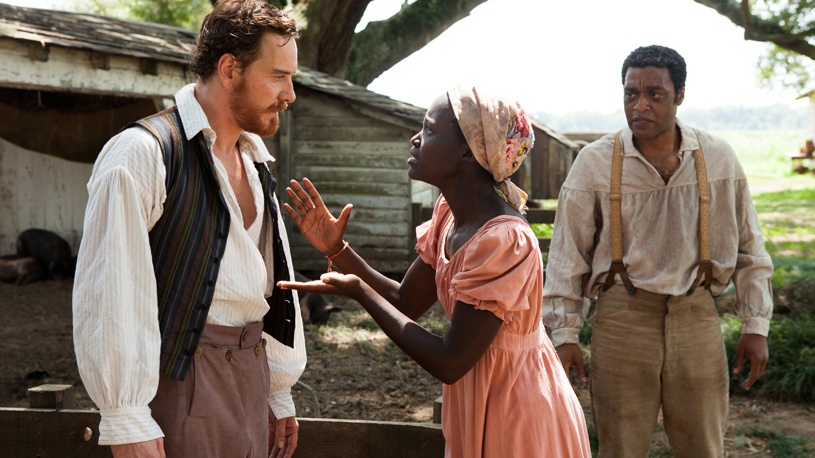By Armond White
Brutality, violence and misery get confused with history in 12 Years a Slave, British director Steve McQueen’s adaptation of the 1853 American slave narrative by Solomon Northup, who claims that in 1841, away from his home in Saratoga Springs, N.Y., he was kidnapped and taken South where he was sold into hellish servitude and dehumanizing cruelty.
For McQueen, cruelty is the juicy-arty part; it continues the filmmaker’s interest in sado-masochistic display, highlighted in his previous features Hunger and Shame. Brutality is McQueen’s forte. As with his fine-arts background, McQueen’s films resemble museum installations: the stories are always abstracted into a series of shocking, unsettling events. With Northup (played by Chiwetel Ejiofor), McQueen chronicles the conscious sufferance of unrelenting physical and psychological pain. A methodically measured narrative slowly advances through Northup’s years of captivity, showcasing various injustices that drive home the terrors Black Africans experienced in the U.S. during what’s been called “the peculiar institution.”
Depicting slavery as a horror show, McQueen has made the most unpleasant American movie since William Friedkin’s1973 The Exorcist. That’s right, 12 Years a Slave belongs to the torture porn genre with Hostel, The Human Centipede and the Saw franchise but it is being sold (and mistaken) as part of the recent spate of movies that pretend “a conversation about race.” The only conversation this film inspires would contain howls of discomfort.
 For commercial distributor Fox Searchlight, 12 Years a Slave appears at an opportune moment when film culture–five years into the Obama administration–indulges stories about Black victimization such as Precious, The Help, The Butler, Fruitvale Station and Blue Caprice. (What promoter Harvey Weinstein has called “The Obama Effect.”) This is not part of social or historical enlightenment–the too-knowing race-hustlers behind 12 Years a Slave, screenwriter John Ridley and historical advisor Henry Louis Gates, are not above profiting from the misfortunes of African-American history as part of their own career advancement.
For commercial distributor Fox Searchlight, 12 Years a Slave appears at an opportune moment when film culture–five years into the Obama administration–indulges stories about Black victimization such as Precious, The Help, The Butler, Fruitvale Station and Blue Caprice. (What promoter Harvey Weinstein has called “The Obama Effect.”) This is not part of social or historical enlightenment–the too-knowing race-hustlers behind 12 Years a Slave, screenwriter John Ridley and historical advisor Henry Louis Gates, are not above profiting from the misfortunes of African-American history as part of their own career advancement.
But McQueen is a different, apolitical, art-minded animal. The sociological aspect of 12 Years a Slave have as little significance for him as the political issues behind IRA prisoner Bobby Sands’ hunger strike amidst prison brutality visualized in Hunger, or the pervy tour of urban “sexual addiction” in Shame. McQueen takes on the slave system’s depravity as proof of human depravity. This is less a drama than an inhumane analysis–like the cross-sectional cut-up of a horse in Damien Hirst’s infamous 1996 museum installation “Some Comfort Gained From the Acceptance of the Inherent Lies in Everything,”
Continue the rest of White’s review at the CityArts website:
www.cityarts.info
http://cityarts.info/2013/10/16/cant-trust-it/
Follow Armond White on Twitter at 3xchair
